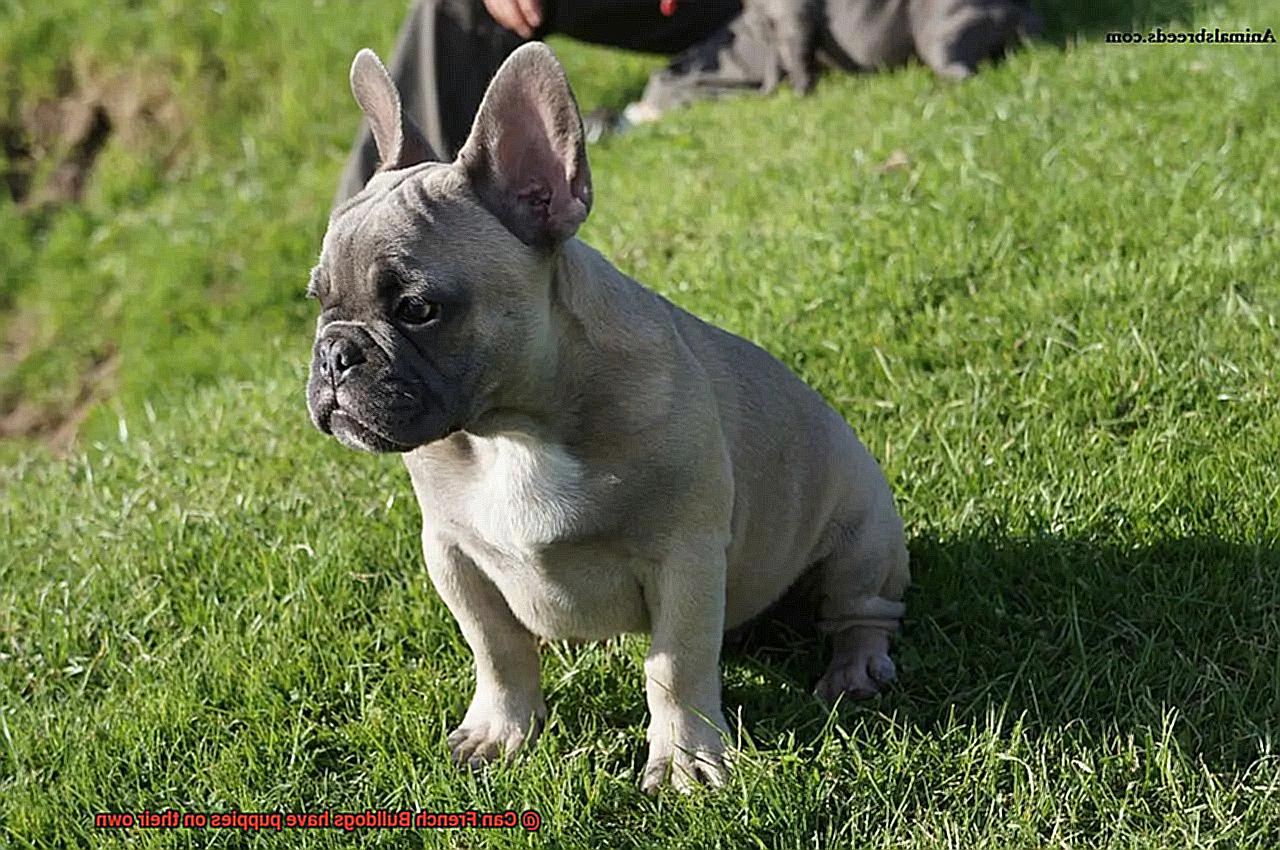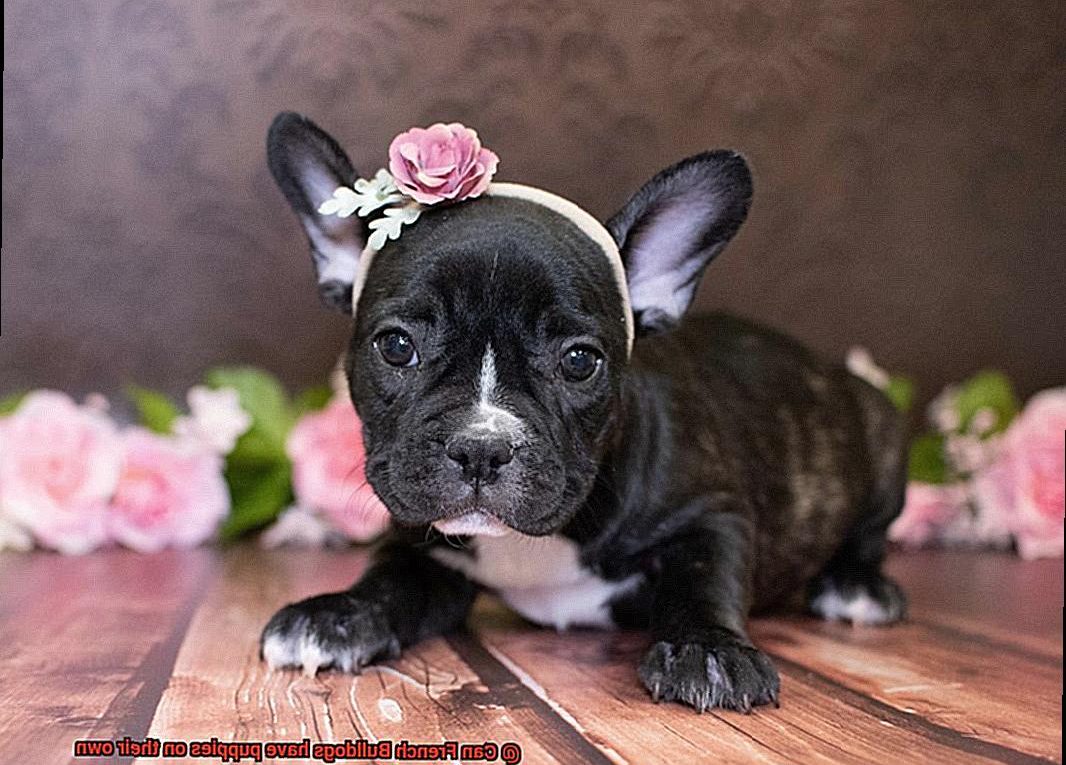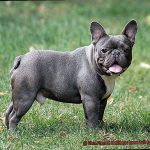Can French Bulldogs have puppies on their own?
Today, we’re diving into a fascinating topic that has piqued the curiosity of many French Bulldog owners: can these adorable little pups actually have puppies without any human intervention? It’s a question that combines our fascination for these lovable companions with an understanding of their unique reproductive systems.
French Bulldogs have captured the hearts of millions with their charming personalities and distinctive physical features. They’re compact, fun-loving, and make fantastic companions for families and individuals alike. But when it comes to reproducing, do they really need our help?
While many dog breeds require human assistance in the breeding process due to size or anatomical limitations, French Bulldogs present a unique case. These lovable goofballs might not be the most proficient breed when it comes to going it alone, but they can certainly give it a shot.
In this blog post, we’ll explore the various factors that impact a French Bulldog’s ability to conceive and deliver puppies without human intervention. We’ll unravel the reasons why some French Bulldogs may struggle with natural reproduction, uncover potential risks involved, and discuss any procedures that may be necessary to ensure a successful breeding experience for both the mother and her offspring.
So if you’ve ever wondered whether French Bulldogs can deliver puppies solo, buckle up and join us on this enlightening canine journey. Together, we’ll gain a deeper appreciation for these magnificent creatures and shed light on the extraordinary reproductive capabilities – or limitations – of our furry friends. Let’s get started.
The Unique Physical Anatomy of French Bulldogs
Contents
- 1 The Unique Physical Anatomy of French Bulldogs
- 2 The Challenges of Natural Breeding for French Bulldogs
- 3 Artificial Insemination for French Bulldogs
- 4 Birthing Difficulties in French Bulldogs
- 5 Understanding the Risks and Benefits of Assisted Reproduction
- 6 Caring For a Pregnant French Bulldog
- 7 Preparing for the Birth of French Bulldog Puppies
- 8 Health Considerations for French Bulldog Puppies
- 9 Conclusion
French Bulldogs are beloved for their adorable appearance and charming personalities. But have you ever wondered what makes them so unique? In this article, we will explore the distinct physical anatomy of French Bulldogs, shedding light on their compact build, distinctive head shape, expressive eyes, and more. By understanding these features, you’ll gain a deeper appreciation for your furry friend’s one-of-a-kind charm.
Compact and Muscular Build:
French Bulldogs boast a sturdy and muscular build that sets them apart from other dog breeds. Their compact physique gives them an irresistibly cute appearance while exuding strength and confidence.
Unique Head Shape:
The most prominent feature of a French Bulldog’s face is its unique head shape. With a square-shaped skull and a short, wide muzzle, Frenchies possess a distinct facial structure that contributes to their charm. However, it’s important to note that this brachycephalic syndrome can sometimes lead to breathing difficulties.
Expressive Eyes:
French Bulldogs are known for their large, expressive eyes that are set wide apart on their faces. These dark-colored orbs not only give them a friendly and alert expression but also make it impossible to resist their soulful gaze.
Well-Defined Neck:
Supporting their relatively large heads, French Bulldogs have a well-defined neck that is thick and muscular. This neck provides stability to their body and adds to their overall balance and proportion.
Compact Body with Deep Chest:
Unlike some other dog breeds, French Bulldogs possess a compact and stocky body with a deep chest. This well-balanced physique showcases their strength and athleticism while maintaining their adorable charm.
Unique “Screw Tail”:
French Bulldogs sport a naturally short tail, often referred to as a “screw tail.” This tail is set low on their body and can be either straight or slightly curved. It is important to note that this tail should never be docked or altered in any way.
Muscular Limbs and Compact Feet:

French Bulldogs have straight and muscular limbs, with well-developed forearms and robust hind legs. Their compact feet feature well-arched toes, completing their overall balanced and sturdy appearance.
Smooth and Soft Coat:
French Bulldogs boast a smooth and soft coat that is short in length. This low-maintenance coat comes in a variety of colors and patterns, including brindle, fawn, cream, pied, and black.
Size:
French Bulldogs are considered a small breed, with an average height ranging between 11 to 12 inches at the shoulder. They typically weigh between 16 to 28 pounds, making them perfectly sized for cuddling and companionship.
The Challenges of Natural Breeding for French Bulldogs
French Bulldogs are undeniably adorable, with their compact bodies, expressive eyes, and charming personalities. However, behind their irresistible charm lies a set of unique physical characteristics that can pose challenges when it comes to natural breeding. In this article, we will explore the hurdles faced by French Bulldogs in the mating process and highlight alternative methods that can help overcome these difficulties.
- Brachycephalic Face: French Bulldogs are known for their short-muzzled faces, which can make it tricky for them to mate naturally. The shape and size of their heads can create alignment issues during mating, making it harder for successful reproduction.
- Compact Body Structure: With their narrow pelvis and compact bodies, French Bulldogs face another hurdle in natural breeding. The male may struggle to achieve proper penetration due to these physical constraints, reducing the chances of successful mating.
- Size and Weight Disparity: Males of this breed are often smaller and lighter than females, which can make it challenging for them to mount and maintain mating positions effectively. This size and weight disparity can further complicate the already complex process of natural breeding.
- High Rate of C-Sections: Due to their narrow birth canal and puppies’ large heads, French Bulldogs have a high rate of caesarean sections (C-sections). Even if successful mating occurs, the female may still require assistance during the birthing process.
- Irresponsible Breeding Practices: Unfortunately, the popularity of French Bulldogs has led to irresponsible breeding practices. Some breeders prioritize exaggerated features such as an even shorter muzzle or a more compact body, which can worsen the challenges of natural breeding for this already vulnerable breed.
It is crucial for owners and breeders to be aware of these challenges and consider alternative methods such as artificial insemination or assisted reproduction techniques. These methods can help overcome the difficulties associated with natural breeding and increase the chances of successful reproduction.
In conclusion, while French Bulldogs may face unique challenges in natural breeding due to their physical characteristics, there are alternative methods available that can help mitigate these difficulties. It is essential for owners and breeders to be informed about these challenges and make responsible decisions regarding their breeding practices. By doing so, we can ensure the health and well-being of this beloved breed for generations to come.
Artificial Insemination for French Bulldogs
French Bulldogs, with their distinctive appearance and lovable personalities, have become one of the most popular dog breeds in recent years. However, their unique anatomy can pose challenges when it comes to natural breeding. Fortunately, artificial insemination provides a solution for breeders looking to expand the French Bulldog population. In this article, we will explore the ins and outs of artificial insemination for French Bulldogs, including the different methods and considerations involved.
Why Artificial Insemination?
Natural breeding can be difficult for French Bulldogs due to their short stature and compact body structure. These characteristics make it challenging for them to successfully mate with larger dogs or even with other French Bulldogs. Additionally, some French Bulldogs may have health issues or physical limitations that prevent them from engaging in natural mating. Artificial insemination offers a safe and effective alternative to overcome these obstacles.
Methods of Artificial Insemination
There are two main methods of artificial insemination for French Bulldogs: vaginal insemination and surgical insemination. Vaginal insemination is a non-invasive procedure where fresh or chilled semen is collected from the male dog and directly deposited into the female dog’s vagina using a catheter or syringe. This method is generally preferred when the male and female dogs are in close proximity to each other.
On the other hand, surgical insemination is a more invasive procedure that requires anesthesia for both the male and female dogs. It involves collecting semen from the male dog and directly depositing it into the female dog’s uterus through a small incision in her abdomen. This method is often used when the male and female dogs are not in close proximity or when there are specific fertility issues that require more precise placement of the sperm.
Factors to Consider
When opting for artificial insemination, breeders must consider several factors to ensure the best chances of success. These include:
- Availability of the male dog: If the male dog is not in close proximity to the female dog, surgical insemination may be the preferred method.
- Health condition of the female dog: Some female French Bulldogs may have reproductive health issues that require surgical insemination to increase the chances of successful conception.
- Expertise of the breeder or veterinarian: Artificial insemination should always be performed by a trained professional to ensure the best chances of success and the health and safety of both dogs involved.
Success Rates and Pregnancy
It is important to note that artificial insemination does not guarantee pregnancy. Several factors, such as the quality of sperm, timing of insemination, and overall fertility of the female dog, can affect successful conception. Working with a knowledgeable breeder or veterinarian who specializes in reproductive medicine will increase the chances of a successful pregnancy.
Birthing Difficulties in French Bulldogs
As a breed known for its charm and lovable nature, it’s essential to understand the challenges these dogs face during the birthing process. In this article, we’ll discuss the specific issues French Bulldogs encounter, offer helpful advice on minimizing risks, and share insights based on first-hand knowledge and credible sources.
Narrow Hips: A Delicate Passage
French Bulldogs’ narrow hips pose a significant challenge during labor. Their wide shoulders and large heads make it difficult for puppies to pass through the birth canal, leading to dystocia. This life-threatening condition requires immediate veterinary intervention, such as a cesarean section, to ensure the safety of both mother and puppies.
Small Litters: Size Matters
French Bulldogs typically have smaller litters compared to other breeds. With only 1-4 puppies per litter, each puppy is larger in size, increasing the chances of dystocia. Breeders should be aware of this and consult with their veterinarian regarding optimal birthing plans.
Brachycephalic Challenges: Breathing Matters

The brachycephalic (short-muzzled) facial structure of French Bulldogs presents additional hurdles during childbirth. Their narrow nostrils, elongated soft palates, and small tracheas can impact their breathing ability during labor. It’s essential to monitor their breathing and oxygen levels carefully.
Recognizing Signs of Dystocia: When to Seek Help
Owners should familiarize themselves with signs of dystocia, including prolonged contractions without progress, excessive straining without delivering a puppy, or visible distress in the mother. If any difficulties arise during labor, immediate veterinary attention is crucial for a safe delivery.
Prenatal Care: A Key to Success
Proper prenatal care is vital for minimizing birthing difficulties. Regular veterinary check-ups and monitoring the mother’s health throughout pregnancy are essential. Working closely with a veterinarian allows for early detection of potential issues and ensures the mother is in optimal condition for giving birth.
Planned Cesarean Sections: A Safe Bet
For French Bulldogs with a history of difficult births or anticipated large litter sizes, breeders may opt for planned cesarean sections. This proactive approach mitigates potential complications and guarantees the safe delivery of puppies. Consult with your veterinarian to determine if this is the right choice for your dog.
Understanding the Risks and Benefits of Assisted Reproduction
French Bulldogs are undeniably adorable and lovable, but they also face unique challenges when it comes to reproduction. In this article, we will explore the risks and benefits of assisted reproduction for French Bulldogs, shedding light on why these techniques may be necessary and how they can improve the breed’s overall health and genetic diversity.
Benefits of Assisted Reproduction for French Bulldogs:
Overcoming Physical Challenges:
French Bulldogs have a distinctive physical appearance, with a large head and narrow hips. Unfortunately, these characteristics can make natural mating difficult or even impossible. Assisted reproduction techniques, such as artificial insemination, allow breeders to bypass these challenges and successfully breed French Bulldogs.
Genetic Selection:
Assisted reproduction enables breeders to carefully select the best genetic matches for their French Bulldogs. By using artificial insemination or other techniques, breeders can choose mates with desirable traits, leading to healthier and better-quality offspring.
Preserving Genetic Diversity:
French Bulldogs have a limited gene pool, which increases the risk of inherited diseases and reduces genetic variation. Assisted reproduction techniques such as in vitro fertilization (IVF) or embryo transfer can introduce new genetic material into the population and reduce the prevalence of certain genetic disorders.
Risks and Considerations:
Financial and Physical Costs:
Assisted reproduction techniques come with financial costs, including veterinary fees for procedures like artificial insemination or IVF. Additionally, these procedures can take a toll on the dogs involved, requiring hormone treatments or surgical procedures that may cause stress.

Complications:
There is always a risk of complications during the reproductive process, such as infections or unsuccessful pregnancies. Breeders should carefully weigh these risks against the potential benefits before deciding to pursue assisted reproduction for their French Bulldogs.
Expert Guidance:
It is crucial to work with a qualified and experienced veterinarian or reproductive specialist who can provide guidance and support throughout the assisted reproduction process. They can help ensure the well-being of the dogs involved and increase the chances of a successful outcome.
Caring For a Pregnant French Bulldog
Caring for a pregnant Frenchie requires special attention and care to ensure a healthy pregnancy and safe delivery. In this article, we’ll explore key considerations for providing the best care for your pregnant French Bulldog.
Regular Veterinary Check-ups:
Just like humans, pregnant dogs need regular check-ups throughout their pregnancy. These visits allow the veterinarian to monitor the health of both the mother and her puppies. Your vet will perform physical exams, check weight gain, and may recommend additional tests or ultrasounds to ensure everything is progressing smoothly.
Proper Nutrition:
Feeding your pregnant French Bulldog a high-quality, balanced diet is crucial for her health and the development of her puppies. Consult with your vet to determine the appropriate diet and feeding schedule. It’s important to provide a diet specifically formulated for pregnant dogs, as their nutritional needs change during this time.
Moderate Exercise:
While exercise is important for maintaining overall health, it’s essential to avoid strenuous activities during pregnancy. Stick to short walks and gentle play sessions to prevent stress on the mother and potential injury to the puppies.
Creating a Comfortable Environment:
As the due date approaches, create a quiet and secure nesting area for your Frenchie. This space should be clean, comfortable, and free from drafts. Provide soft bedding materials to ensure your dog’s comfort during labor and nursing.
Monitoring Weight Gain:
Regularly monitor your Frenchie’s weight gain during pregnancy. Rapid weight gain may indicate an underlying health issue, while slow or no weight gain could be a cause for concern. Keep track of her weight with regular weigh-ins to ensure she stays within a healthy range.
Proper Hygiene:
Maintaining proper hygiene is essential to prevent infections. Keep the vulva area clean and check for any signs of discharge or abnormality. If you notice anything unusual, consult with your vet immediately.
Preparing for Labor:
Educate yourself on the signs of labor in dogs and have a plan in place for assistance if needed. Familiarize yourself with the stages of labor and potential complications. It’s crucial to have your vet’s contact information readily available in case of emergencies.
Providing a Safe Whelping Area:
Prepare a comfortable whelping box or area where your Frenchie can safely deliver and care for her puppies. This space should be warm, clean, and free from drafts. Provide bedding that is easily washable to maintain cleanliness.
Post-Delivery Care:
After delivery, closely monitor both the mother and puppies. Ensure that all puppies are nursing and gaining weight appropriately. If you notice any concerns, such as lack of appetite or weight loss, seek veterinary assistance promptly.
Preparing for the Birth of French Bulldog Puppies
In this guide, we’ll walk you through the essential steps to make this experience as comfortable as possible for your furry friend.
Prioritize Health and Wellness:
Before the due date, schedule a visit to the veterinarian for a thorough check-up. This will help identify any potential complications and ensure your Frenchie is in good health. Discuss nutrition, exercise, and any additional care needed during pregnancy and lactation.
Create a Cozy Birthing Area:
Designate a warm, quiet, and clean area for your Frenchie’s birthing process. Consider using a whelping box specifically designed for this purpose. It should be large enough for her to move comfortably but small enough to contain the puppies once they are born.
Proper Nutrition is Key:
Provide your Frenchie with a high-quality diet that caters to her nutritional needs during pregnancy and lactation. Consult with your veterinarian about the right balance of nutrients, especially calcium and protein, to support her overall health and the healthy development of her puppies.
Gather Essential Supplies:
Gather all necessary supplies before the birth. These include clean towels or blankets to keep the newborns warm, sterile scissors or hemostats to cut the umbilical cords if needed, and a heating pad or heat lamp to maintain a stable temperature in the birthing area.
Identify Signs of Labor:
Educate yourself about the signs of labor in French Bulldogs. Common signs include restlessness, nesting behaviors, loss of appetite, and a decrease in body temperature. Keep a close eye on your Frenchie during this time and contact your veterinarian if you notice any concerning symptoms or a prolonged labor.
Emergency Preparedness:
Have a plan in place in case of any emergencies during the birth. Keep the contact information of a veterinarian who is available 24/7 handy. Familiarize yourself with signs of complications like dystocia (difficult labor) or uterine inertia (lack of contractions) to ensure prompt and appropriate action if needed.
Health Considerations for French Bulldog Puppies
French Bulldogs are undoubtedly adorable, but they come with their own set of health considerations. As an expert in French Bulldog health, I want to ensure your puppy has the best start in life. Here are some key health considerations to keep in mind:
- Genetic Health Issues: French Bulldogs are prone to certain genetic conditions, such as Brachycephalic Syndrome. This can cause breathing difficulties due to their flat faces and narrow nostrils. Choosing a reputable breeder who conducts health tests on their breeding dogs is crucial in minimizing the risk of passing on these conditions.
- Exercise Needs: While French Bulldogs may not be as energetic as other breeds, they still require regular exercise. However, be cautious not to overexert them, especially in hot weather. Their compromised respiratory system makes them susceptible to heatstroke. Opt for short walks and play sessions during cooler parts of the day.
- Diet and Nutrition: Proper nutrition is vital for the overall health and development of your French Bulldog puppy. Consult with your veterinarian to determine the best diet for your pup’s breed and age. They have specific dietary requirements that should be met through a balanced diet.
- Vaccinations and Preventive Care: Like any other dog, French Bulldog puppies need vaccinations to protect them from common diseases. Regular visits to the vet for check-ups, deworming, and preventive treatments against fleas, ticks, and heartworms are essential.
- Dental Health: French Bulldogs are prone to dental issues, including periodontal disease and tooth decay. Establishing a dental care routine early on is crucial, including regular brushing and providing appropriate chew toys for good oral hygiene.
- Socialization and Mental Stimulation: French Bulldogs thrive on social interaction and mental stimulation. Expose them to different people, animals, and environments from a young age. Engage them in interactive play and provide puzzle toys to prevent boredom and destructive behavior.
Conclusion
In conclusion, French Bulldogs cannot have puppies on their own.
Due to their unique physical characteristics and breeding challenges, they require human intervention and assistance in the breeding process. It is essential for owners to be aware of the potential risks and complications that can arise during pregnancy and delivery for French Bulldogs.
By working closely with a reputable veterinarian and following proper breeding practices, responsible breeders can help ensure the health and well-being of both the mother and her puppies.




